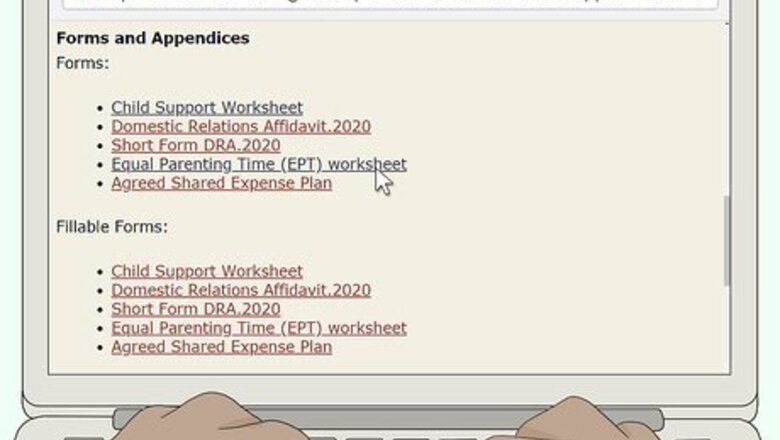
views
X
Trustworthy Source
WomensLaw.org
Site associated with the National Network to End Domestic Violence aimed at providing free legal resources and aid to survivors of domestic violence.
Go to source
Typically, custody is awarded to one of the child's parents. In rare circumstances, a Kansas court may temporarily award custody to a non-parent, such as a grandparent. If you and the other parent cannot come to an agreement regarding custody and child support issues on your own, the judge will make a decision based on the best interests of your child.[2]
X
Research source
Negotiating a Custody Agreement
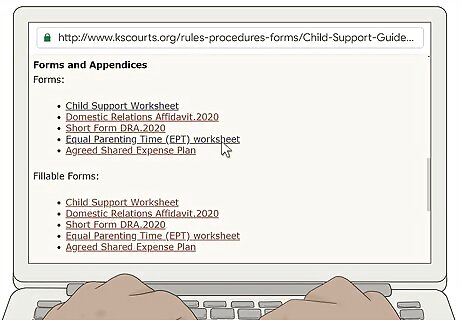
Find worksheets and calculators to assist you. Kansas calculates child support based on a specific formula. Online, you'll find worksheets and interactive calculators that can assist you in figuring out visitation and child support. Generally, judges won't prohibit one parent from having access to the child unless there is evidence of child abuse or other circumstances that would be harmful to the child. This means even if you have primary custody, chances are the other parent will still have visitation. The Kansas Judicial Branch has child support and parenting time worksheets available for download at https://www.kscourts.org/rules-procedures-forms/Child-Support-Guidelines/default.asp.

Gather financial documents and schedule information. To calculate child support, get information about your income and expenses, as well as the income and expenses for the other parent. For the parenting time worksheets, get information about your work schedule, the other parent's work schedule, and the child's school schedule. The parenting time worksheet includes holidays and gives you room to work out which parent the child will spend major holidays with. You'll likely want to consider other special days as well, such as your birthday, the other parent's birthday, and the child's birthday. If the other parent isn't willing to give you information about their schedule and financing, you probably won't be able to negotiate a custody agreement. Instead, you'll have to go ahead and file a custody lawsuit and use the court to force them to release the information.

Talk to the other parent about parenting time and child support. Share your parenting time and child support worksheets with the other parent, then make arrangements to get together and discuss any issues. Depending on your relationship and how well you get along with the other parent, this might be a rather tense discussion. Try to stay objective and focus on the best interests of the child rather than any emotional issues. If you are in the process of divorcing the child's other parent, keep in mind that you are divorcing them, not the child. When discussing parenting time and child support, try to set your emotions aside and consider what would be best for your child. If you aren't able to do that (or if the other parent isn't able to do that), you might not be able to come to an agreement on your own.Warning: If you're filing for custody as part of a protection order against the other parent, don't attempt to sit down and talk with them about custody. It's better to leave it for the court to decide in that instance.

Try mediation if you and the other parent can't agree. With mediation, a neutral third party helps you and the other parent arrive at a mutually agreeable compromise on your issues. Mediators are especially helpful if you and the other parent have difficulty communicating or can't set your emotions aside to deal with the custody issues. Judges often require parents who can't agree on custody issues to try mediation anyway, so it doesn't hurt to try it on your own. The clerk of the court where you plan to file for child custody will have a list of approved mediators you can try. If you have a low income and are worried about cost, ask about mediators who volunteer their time or have a sliding-fee scale based on income.Tip: Even if you can't agree on everything, you may be able to eliminate some of the issues you had before. This will simplify your custody lawsuit.

Present your agreement to a judge for approval. If you and the other parent have agreed on child support and parenting time, complete the Agreed Shared Parenting Plan to submit to the judge. You can download a blank copy of the form on the website of the Kansas Judicial Branch. You'll still have to file a lawsuit for divorce or parentage. However, the process will go a lot more smoothly if you already have an agreement on custody and child support. The judge will presume that your agreement is in the best interests of the child.
Filing the Appropriate Lawsuit
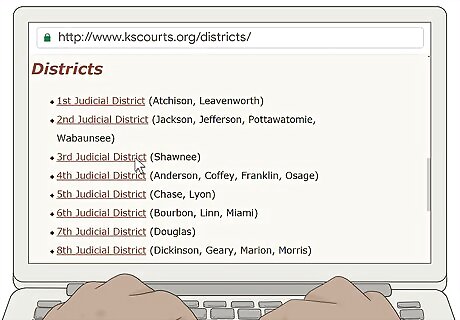
Choose the court that you want to hear your lawsuit. In Kansas, you must file either a divorce, protection order, or parentage lawsuit to have custody issues decided. Generally, you can file any of these lawsuits in the county where you live. If the other parent lives in a different county, you can also file the lawsuit in the county where they live. To find your court, go to https://www.kscourts.org/districts/ and click on your county on the map or choose your county's name from the drop-down menu. You have to live in the state of Kansas for at least 60 days before you can file a petition for divorce. It doesn't matter what state you were married in.
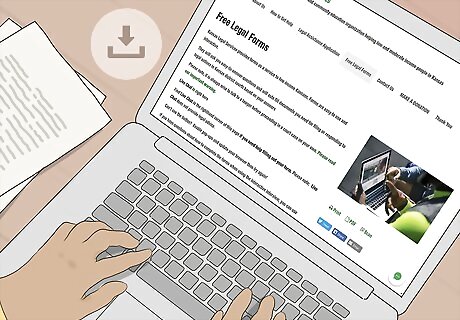
Download the correct forms for your lawsuit. There are free forms available online for free for each of the types of lawsuits you must file if you want to file for child custody. Kansas Legal Services has forms available at https://www.kansaslegalservices.org/node/785/free-legal-forms. There are also free forms available from the Kansas Judicial Council at https://www.kansasjudicialcouncil.org/legal-forms. Choose a parentage action if you gave birth to the child and paternity has not yet been established. If you were married to the other parent when the child was born, your spouse is presumed to be the child's parent. Use a protection order if you feel that the other parent is a danger to the safety of you and your child.Tip: Check the website for your county court as well. You may find forms there, including local forms that are specific to that court.
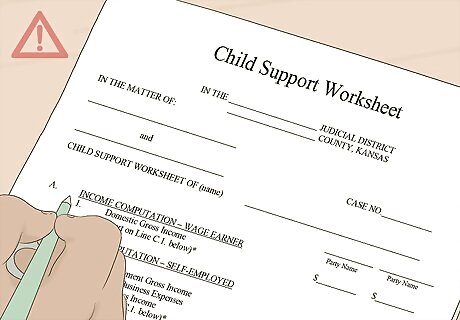
Fill out your forms carefully. Provide as much specific information as you can. If you leave out any details, you may hurt your chances of getting the parenting plan and child support you want for your child. Double-check all the information you provide to make sure it's correct. Keep in mind that you'll have to prove each of the things you say on your forms. As you fill out the forms, gather documents that support each of your statements or start a list of documents that you'll need to get if you don't have them in your possession.
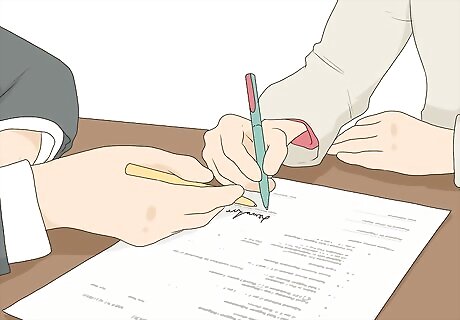
Sign your forms in the presence of a notary. If you're filing a petition for divorce or a petition for parentage, your signature must be notarized. The notary verifies your identity, so you'll need to bring a government-issued photo ID with you to the notary. The notary doesn't review your forms or check them for completeness or accuracy. Their only role is to confirm that you are signing the documents and that you are doing so voluntarily.Tip: When you sign your forms and have them notarized, make at least 2 photocopies. One is for your records and the other is for the other parent.

File your forms with the clerk of court's office. Take your original paperwork and the photocopies to the clerk of the court that you want to hear your lawsuit. The clerk will file-stamp your originals and photocopies, then give the photocopies back to you. Ask the clerk what you need to do next. They can answer questions about the process. However, they can't give you legal advice. If you want to talk to a lawyer and are worried about the cost, the clerk can point you toward free and reduced-cost legal resources.

Pay the filing fee or apply for a waiver. The filing fee for divorce and parentage actions varies among courts, but typically is between $200 and $300. Call ahead to the clerk's office to verify the fees and find out what methods of payment are accepted. You may also be able to find this information on the court's website. If you can't afford the filing fee because you have a low income, fill out an application for a fee waiver. On the application, you'll have to provide details about your finances and any government benefits you're currently receiving (such as TANF or food stamps). If you're planning on applying for a fee waiver, bring financial documents with you, such as pay stubs or benefit letters, that will prove the information you provide on the application.Tip: Protection orders are always free. The court will decide custody issues, if necessary, including visitation and child support, as part of the protection order.

Have the other parent served with the forms. Service of court papers provides evidence to the court that the other parent knew about the lawsuit. This is important if the other parent doesn't respond to your lawsuit, which could enable you to get everything you want by default. The usual method of service is to pay a sheriff's deputy to deliver the papers to the other parent in person. If you qualified for a fee waiver, a sheriff's deputy will serve the papers on the other parent free of charge. Once service is complete, the sheriff's deputy will fill out a proof of service form and send it to you. File this form with the clerk of court.
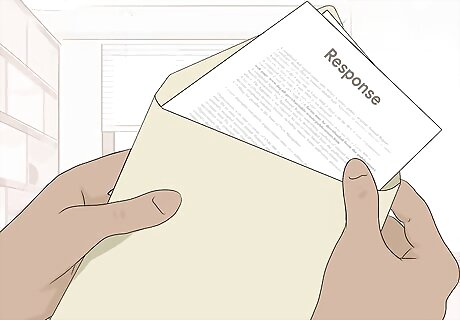
Wait for the other parent's response. After the other parent has been served, they have 20 days to respond to your lawsuit. You'll receive a copy of their response in the mail. If you don't receive anything after 25 days or so, call the clerk's office and find out if an answer was filed. You may have to go to the clerk's office and pick it up. Read the other parent's answer carefully, particularly if they've denied any of the allegations in your petition. If the other parent has hired a lawyer and is contesting your petition, you should hire a lawyer as well. If the other parent doesn't respond or if they indicate they're not going to contest your petition, contact the clerk to schedule your hearing. Uncontested hearings are generally brief. The judge will ask you a few questions and then issue an order based on your petition. The other parent does not have to attend.
Participating in a Contested Case

Hire an experienced family lawyer to represent you. Contested custody cases are not only complex, but also stressful and emotional experiences. If you haven't been able to come to an agreement with the other parent, talk to several family lawyers and hire the one who you feel most comfortable with. Family lawyers typically give a free initial consultation, so you can use these meetings to interview several lawyers. The Kansas Bar Association has a lawyer referral service you can access by visiting https://www.ksbar.org/page/lrs_public or calling 1-800-928-3111. If you call, ask for the name of lawyers near you who handle domestic relations cases. If you have a low income and are concerned about your ability to pay attorney's fees, Kansas Legal Services (KLS) can help you find free or low-cost representation. To find the KLS office that serves your county, call 1-800-723-6953 or visit https://www.kansaslegalservices.org/.

Work with your attorney to prepare your petition or answer. Your attorney will get information from you about your finances, your schedule, your child's schedule, and your relationship with the other parent. They will also likely ask you questions about your child's relationship with you and with the other parent. Based on your answers, they'll draft your petition. If the other parent has already filed a petition, or if they've filed a response to your original petition, your attorney will help you draft an answer or response. If there have already been filings in your case, give copies of those documents to your attorney. They may want to file amendments.

Gather evidentiary documents for your attorney. Your attorney will likely prepare a list of documents that they need from you. These documents provide information about your finances, work, and schedule. You'll also need your marriage certificate if you're filing for divorce, as well as your child's birth certificate. Other documents your attorney needs will depend on the details of your case. For example, if health insurance for your child is a contested issue, you'll need information about the health insurance available for both you and the child's other parent. Your attorney will also work to get documents from the child's other parent. As part of your custody case, you and your attorney have the right to any documents that are related to a contested issue, such as financial and employment documents from the other parent.

Participate in depositions if necessary. Depending on the contested issues in your case, the other parent (or their attorney) may want to ask you questions under oath. Your responses in the deposition are recorded and can be used as evidence in the hearing. Most child custody cases don't involve extensive depositions, and likely won't involve depositions of anyone other than you or the other parent. However, in some cases, your attorney may want to depose other family members, your child's teacher, or other experts, such as child psychologists, counselors, or medical doctors.

Talk to potential witnesses. As part of the hearing, you can have other people come and testify on your behalf about matters related to the contested issues. Witnesses may include family members, your child's teacher, or experts, such as child psychologists or counselors. For example, if one of the contested issues is the other parent's relationship with the child, you may bring witnesses who can say that they've never seen the other parent around the child. If you or the other parent has made allegations of abuse or neglect, you're likely to need more witnesses to testify regarding those allegations. In a standard child custody case, however, witnesses typically aren't called. The other parent may also call witnesses. You (through your attorney) will have the right to ask those witnesses questions at the hearing, just as the other parent will have the opportunity to ask your witnesses questions.

Try mediation if ordered by the judge. Family court judges typically prefer when parents work out custody issues on their own, rather than being ordered to do something through the court. If you haven't already tried mediation, the judge may order you to attempt it before scheduling your final hearing. No specific outcome is required from mediation and you won't be in any sort of trouble if the two of you are unable to come to an agreement. The important thing is to make a reasonable effort to resolve as many of your issues as possible on your own. If the judge orders mediation and you don't come to an agreement, the mediator will prepare a report for the judge outlining the issues that are still contested. If you do come to an agreement, on the other hand, the mediator will write the agreement up for you and you can present it to the judge for approval.Tip: Let your attorney know if you don't feel comfortable trying mediation. If the relationship between you and the other parent is too traumatic, or if there are allegations of abuse, the judge may forego mediation and move directly to scheduling the final hearing.

Attend your final hearing. On the day of your final hearing, dress as you would if you were going to a job interview or a church service. You'll likely meet your attorney before the hearing, either at their office or near the courthouse, so you can go over the case one final time. Then you'll enter the courthouse together and take a seat in the gallery of the courtroom until your case is called. Pay attention during the hearing, especially when the judge is speaking. If the other parent brings witnesses, you might want to take notes in case they say anything that you want your attorney to ask about. If, at any time, something strikes you as incorrect or you feel uncomfortable, let your attorney know. If the process gets to be too much for you, your attorney can ask the judge to take a break.













Comments
0 comment